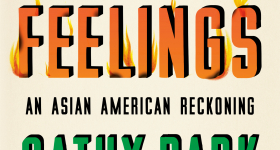“Mom, am I white?” A few weeks ago, when I got this question from my four-year-old, I wasn't sure what to say. Technically my son is “biracial” -- but that label does him a severe representative
injustice, because his bloodline is actually Japanese, Taiwanese, Slovakian,
German, French Canadian, British, and Welsh. He also does not possess a parent
of just one race and a parent of another race, as if often assumed when people hear the term “biracial” -- because both my husband and I are mixed-race
Asian/White too. For these reasons, I much prefer to describe us, and our son, as
multiracial.
I write about and research race, families, and children, with
an especial focus on multiraciality. I don’t believe in avoiding race talk with my child, though I do try to discuss it in age-appropriate ways. I’ve tried to stand by my conviction that
it’s better he learn how to think and talk about these issues within the family
first, rather than have normative ideals force-fed down his throat by everyone
else when he walks out the door. That said, I wasn’t fully prepared when he turned to me and
asked, “Mom, am I white?”
When I told him no, he immediately followed up with,
“Am I Black?” When told he wasn’t, he started crying and told me, “But I want a color, too.”
I know something about battling with the obscurity of
race-labels, as I have never fit neatly into boxes myself. But I really didn’t
expect to have a discussion like this with my son until he was older. As I sat there, stumbling over describing “Black” and
“white” to him in the context of skin tone, I could see profound confusion
cross his face. And then I stopped talking, because he was totally right, of
course. As we all know on some level, nobody really
has black or white skin. We’re all various shades of brown, almond, caramel, tan, pink, peach –- there are a million more accurate colors for skin pigment. Nothing better unveils the ridiculous, arbitrary,
and shallow nature of the supposed race divisions than trying to explain
race-labels to a still pretty literal preschooler. In the end he and I
got to talking about brown and color mixing, and he finally decided he was “a
mix-up of brown and white.”
I know that race is very real, and that it
needs to be constantly and critically addressed. I realize that my son, though
he might not have the words or cognizance to tell me so yet, already knows a
great deal about the racial hierarchy -– including that he most certainly does
not sit at the top of it.
And when I tell him he’s not white, I also know I’m telling him that some
things will always be harder for him than for his white friends, and that
people will sometimes treat him in ways his white friends will never have to
endure. As a parent of color whose soul will be forever connected to the
wellbeing of her child, it hurts that I have to be the bearer of this bad news -–
especially because I worry that my son already feels “less” because of his
race.
In our family, we have the additional complexity of
overlaying all these tough conversations with being “mixed” -- falling somewhere in between our nation’s incredibly polarized white-constructed racial extremes, and also being left uncomfortably off the spectrum entirely and existing in some sort of ambiguous racial ether. Sometimes I
imagine the conversation with my son unfolding like this over the years:
Yes, honey, separating
people into races is illogical, but racial categories do exist and they are
nasty. No, you’re not white. Well, yes, your paternal grandpa and maternal
grandmother are White –- but you’re still not white. No, you’re not Black,
either -- or Latin@ or Native. You’re Asian, but other Asians might not
accept you on that count, so be prepared. Then again, if non-Asians see you as
Asian, that might have repercussions for you too. What race are you and how should you prepare? I’m sorry, honey. I should know, being
mixed-race myself, but I think I really might have no idea.
All this complexity and insufficient language leaves me with
the million-dollar mixed-race parenting question: How do you prepare your
multiracial child to exist in a society that persists in being racially
divided, when he’s one of the many stuck straddling the divide? How do you give
him a straight answer to a question to which you don’t even have the answer?
How do you foster a meaningful discussion on a topic most adults typically avoid talking about because it’s so overwhelming
confusing and painful –-before your son even starts kindergarten?
***
Sharon H. Chang writes about these questions and much
more in her forthcoming book on multiracial Asian children. She has an
M.A. in Human Development with an Early Childhood Specialization, writes
for ParentMap Magazine and Racism Review, and maintains the blog Multiracial
Asian Families. Sharon currently lives in Seattle, WA with her 100% mixed-race husband and mixed-race son.









Comments